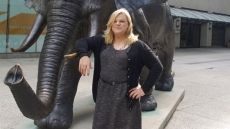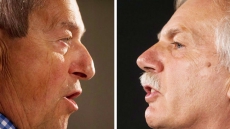VANCOUVER - Gillian Bennett's family scattered her ashes this weekend, in a quiet ritual shared by those she loved.
She was, after all, an intensely private person, her daughter said.
But the 83-year-old grandmother's heart wrenching and public goodbye before taking her own life two weeks ago cast what she felt was a necessary spotlight on her life, her death and the country's laws around assisted suicide.
"I will take my life today around noon. It is time," she began.
Facing the ravages of dementia, Bennett made her way to a favoured spot near her home on Bowen Island, just off the coast near Vancouver, and took a lethal dose of barbiturates.
Jonathan, her husband of 57 years, was by her side.
"There comes a time, in the progress of dementia, when one is no longer competent to guide one's own affairs. I want out before the day when I can no longer assess my situation, or take action to bring my life to an end," she wrote in the four-page letter posted online by her son after her death — as per her request.
In it, she set out her options as she saw them: a "mindless body" in need of constant care, possibly from her family, or life in a care facility, or suicide.
"Ethically, this seems to me the right thing to do," she wrote of the last option.
A trained psychotherapist, Bennett eloquently laid out her analysis of illness and death. She calculated the cost of her care as high as $75,000 and chastised the post-war social welfare state as a "generational Ponzi scheme."
Bennett's daughter, Sara Fox, said her family has been inundated since www.deadatnoon.com went online. More than 800 people have emailed — all but two of them offering support.
"I think for all of us it feels pretty amazing that my little old mom has this triumph," she said. "She stuck to her guns, she insisted and look. I guess she was just right, people did have some kind of need to talk about these issues and she's given them a push."
Bennett told her family of her plans but did not allow them to take part. It is a crime in Canada to assist in a suicide.
In her final hours, she wouldn't allow her husband to drag a mattress to the spot she had chosen to die, worried even that could cause him trouble.
"That pretty much broke his heart, that he couldn't help her with that. She was pretty frail herself," Fox said.
In her letter, Bennett lamented the law.
"This is all much tougher than it need be on Jonathan, and I wish he did not have to be alone with his wife's corpse," she wrote.
"Today, now, I go cheerfully and so thankfully into that good night. Jonathan, the courageous, the faithful, the true and the gentle, surrounds me with company. I need no more."
Bennett's is not the first public plea for change.
A year ago Dr. Donald Low, who guided Toronto through the 2003 SARS crisis, made a videotaped plea in favour of physician-assisted suicide prior to his death from a brain tumour.
This summer Kim Teske, a 52-year-old with Huntington's disease, invited the Globe and Mail to document her death by wilful starvation and in March, Toronto lawyer Edward Hung, 62, issued a public appeal before he flew to Switzerland to end his life. Hung had ALS.
Next month, the Supreme Court of Canada will hear appeals in a case involving two B.C. women who challenged the country's law against euthanasia.
Two years ago, a B.C. Supreme Court judge ruled in favour of Gloria Taylor and found that the existing law was unconstitutional.
The judge delayed the ruling for a year to allow the federal government to rewrite the legislation, but granted Taylor an exemption so she could seek assisted death. Taylor didn't use that exemption, but died of an infection in 2012.
In 2010, Lee Carter took her mother, Kay, to Switzerland — at her request — for a physician-assisted suicide. Carter, 89, was confined to a wheelchair and in chronic pain due to spinal stenosis.
Lee Carter joined the B.C. case that will go the country's highest court.
Assisted suicide is permitted in several European countries, including Switzerland and the Netherlands, and in five U.S. states, including Washington and Oregon.
In June, Quebec became the first jurisdiction in Canada to allow euthanasia. That legislation has already been challenged in court.
Lawyer Hugh Sher will represent the Euthanasia Prevention Coalition at the Supreme Court of Canada hearing in October. The group will also apply for intervener status in a court challenge to Quebec's legislation.
"There's obviously a lot of compelling, sympathetic personal narratives relative to these issues," Sher said.
"But they don't ultimately address the fundamental public policy question, and that is: based on existing practices and based on other regimes — it is not possible to implement a series of safeguards that would effectively prevent abuse and the death and killing of vulnerable and at-risk people."
Neither the government, the courts nor the health-care system can be trusted with the power to take a person's life, said Gerald Chipeur, council for the Christian Legal Fellowship, which is also an intervener in the high court case.
He pointed to the thousands of involuntary sterilizations performed under Alberta's shameful Sterlization Act, which remained in place until 1972.
Right-to-die laws give doctors too much power, Sher said.
"It's cold comfort to offer death as a response to suffering and indignity from a society that overwhelmingly considers disabled lives to be dominated by suffering and indignity," he said.
But Fox believes the right to die can be legislated in a thoughtful and effective manner.
"Certainly, assisted suicide doesn't lead to more deaths. We're all going to die anyway," she said. "It doesn't lead to more deaths but it could lead to less suffering."
Gillian Bennett is survived by her husband, her children Sara and Guy, two granddaughters and four grandsons.
A chronology of major events in the right-to-die debate in Canada
January 1992 - Quebec Superior Court rules in case of Nancy B. that turning off her respirator at her request would not be a criminal offence.
August 1992 - Toronto nurse Scott Mataya, charged with first-degree murder is death of a terminally ill patient, entered guilty plea to a lesser charge of administering a noxious substance. He receives a suspended sentence and must surrender his nursing licence.
1992 - Sue Rodriguez, a Victoria woman with amyotrophic lateral sclerosis (ALS), files a lawsuit in B.C. Supreme Court challenging the laws against assisted suicide. The B.C. court upholds the law.
Sept. 30, 1993 - In a 5-4 decision, Supreme Court of Canada dismisses Rodriguez's appeal, upholding the blanket ban on assisted death.
Feb. 12, 1994 - Sue Rodriguez dies in her Victoria home with the help of an anonymous doctor.
May 6, 1997 - Halifax's Dr. Nancy Morrison charged with first-degree murder in the death of a terminally ill cancer patient. In February 1998, a judge declined to commit Morrison to stand trial.
1997 - Oregon passes a bill allowing doctors to prescribe life-ending doses of medication to terminally ill patients.
May 1998 - Dr. Maurice Généreux sentenced to two years less a day and three years’ probation for providing drugs to two non-terminal patients so they might commit suicide. The next year, that sentence was confirmed by the Ontario Court of Appeal.
April 2002 - Netherlands becomes the first country to legalize physician-assisted suicide.
September 2002 - Belgium allows euthanasia.
Sept. 28, 2004 - Marielle Houle charged in Montreal with aiding and abetting the suicide of her 36-year-old son. On Jan. 23, 2006, she pled guilty and was sentenced to three years’ probation with conditions.
Nov 5, 2004 - A B.C. court acquitted Evelyn Martens, 73 and a member of the Right to Die Society of Canada, of aiding and abetting the suicide of two women in 2002.
June 2007 - A B.C. court sentenced Dr. Ramesh Kumar Sharma for aiding the suicide of Ruth Wolfe, a 93-year-old woman suffering from heart problems, by prescribing her a deadly dose of drugs. He received a conditional sentence of two years less a day and his licence was revoked.
Feb. 19, 2008 - Luxembourg legalizes euthanasia.
June 15, 2012 - B.C. Supreme Court finds that Criminal Code provisions preventing physician-assisted death contravene charter equality rights in case brought by Gloria Taylor.
Oct. 10, 2013 - Appeal Court overturns decision.
Oct. 25, 2013 - B.C. Civil Liberties files leave to appeal to Supreme Court of Canada.
February 2014 - Belgium becomes first country to legalize euthanasia for terminally ill children, with the consent of their parents.
June 5, 2014 - Quebec becomes first province to legalize doctor-assisted death.
Oct. 15, 2014 - SCOC hearings to begin.





